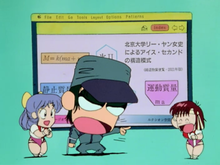- Omake
-
Part of a series on Anime and Manga 
Anime History • Companies
Fansub • Fandub
Longest series • Anime industryManga History • Publishers
Scanlation • Dōjinshi
International market
Longest series
Mangaka (List)Demographic groups Children
Shōnen • Shōjo
Seinen • JoseiGenres Harem • Magical girl
Mecha • Yaoi • YuriSelected biographies Shotaro Ishinomori
Rakuten Kitazawa
Kōichi Mashimo
Katsuji Matsumoto
Leiji Matsumoto
Hayao Miyazaki
Go Nagai
Yoshiyuki Tomino
Shoji Kawamori
Toshio Suzuki
Osamu Tezuka
Year 24 GroupFandom Conventions • Clubs • Cosplay
Anime music video • Otaku
Yaoi fandomGeneral Omake • Terminology Anime and Manga Portal Omake (御負け, usually written おまけ) means extra in Japanese. Its primary meaning is general and widespread. It is used as an anime and manga fandom term to mean "extra or bonus".[1] In USA, the term is most often used in a narrow sense by anime fans to describe special features on DVD releases: deleted scenes, interviews with the actors, "the making of" documentary clips, outtakes, amusing bloopers, and so forth. However, this use of the term actually predates the DVD medium by several years. For at least the past 50 years in Japan, omake of small character figurines and toys have been giveaways that come with soft drinks and candy and often the omake is more desired than the product being sold.
 A screenshot of an anime omake, taken from Gunbuster. Here, chibi versions of the main characters attempt to explain the concept of "Ice II".
A screenshot of an anime omake, taken from Gunbuster. Here, chibi versions of the main characters attempt to explain the concept of "Ice II".
In English, the term is often used with this meaning, although it generally only applies to features included with anime, tokusatsu, and occasionally manga. It is thus generally limited to use amongst fans of Japanese pop culture (sometimes called otaku); like many loan words from Japanese, omake is both the singular and plural form.
Omake often include comedy sketches where the characters behave out of character, break the fourth wall, or subtly address opinions of the fandom known to the writers. Sometimes scenes from the TV show or OVA are humorously re-dubbed. One example, included on the Video Girl Ai DVD, replays scenes from the OVA series with new voice-acting in a rural accent. Other times, the same actors voice a new script that is more sexually suggestive, often ludicrously so. Omake can also consist of non-canonical, and often comedic crossover clips that sometimes occur at the end of episodes of two shows airing concurrently from the same studio, such as recent Kamen Rider and Super Sentai programs.
For anime, these are often presented in super deformed style, in the same way manga omake often is. For example, Gunbuster features super deformed characters trying to explain what the writers know to be mostly pseudo-science, or talking about their relationships with each other in a way they do not in the series itself, or in the popular anime series Reborn!, after a couple of episodes one of the characters named Haru Miura has an interview called "Haru-Haru's dangerous interview corner" with each of the characters of the anime in chibi forms, the characters' answers to the questions are often something they would never say in the anime or the manga. For live action programs, although not animated, the expressions and sound effects used for comedic purposes can often be inspired by the omake found in the animated mediums.
The term Omake has use also in video games; the Sega game Shenmue II for the Dreamcast had a hidden folder on the game disc labelled "Omake", found by placing the disc into a computer, containing exclusive wallpapers and conception art.
Another example of an omake in popular culture is related to Square's Final Fantasy IX. The secret "Blackjack" minigame after completion of the game is accessed by means of a button combination. The Final Fantasy "Playonline" site has a secrets section for Final Fantasy IX, which requires passwords given in the official Piggyback guide to enter. The password needed to reveal the button combination for the Blackjack minigame is E-OMAKE. The minigame itself is, of course, an omake.
Omake occasionally appears in fanfiction about anime or manga, after the story itself, usually as a humorous "alternative ending".
See also
References
Categories:- Anime and manga terminology
- Japanese words and phrases
Wikimedia Foundation. 2010.
